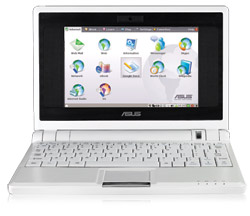Ultra Low-Cost Laptops: A Viable Option For SMBs?Ultra Low-Cost Laptops: A Viable Option For SMBs?
But don't throw away your traditional notebook just yet.

No one likes to spend more than they have to on a computer. And no one likes to carry around more weight than they have to. You'd think that would make a killer combination for ultra-low-cost ultra-portables like the Asus eeePC, OLPC XO, and HP 2133 Mini-Note. And now a new teeny tiny machine is on the way from Dell.
But don't throw away your traditional notebook just yet.Despite rosy sales forecasts by Intel and Asus (which says it may sell up to 5 million eeePCs this year), I just don't see these mini-machines catching on as replacements for mainstream laptops. Instead, I agree with IDC that they "will primarily find success as mobile, secondary computing devices."
I'd hate to rely on these machine's itty bitty screens and cramped keyboards all the time. But there are plenty of times when I need more than a Blackberry but don't want to lug around my full-size laptop. Sure, it would be great if there were a fleet of Apple Macbook Airs or Lenovo ThinkPad X300 laying around the IT department for my use, but I think their stratospheric price tags make that unlikely.
Instead, companies spending $400 on an eeePC or two is a much more likely scenario. It's a perfect device for occasional mobile use, and while it's not that much cheaper than a conventional laptop, it weighs only a couple of pounds and so could pay for itself in reduced chiropractor visits alone. The HP 2133 Mini-Note is slightly heavier and more expensive, but runs Windows Vista instead of Linux, if that matters to you.
According to Gizmodo, the new Dell entry comes in bright red and sports 3 USB ports, a card reader, VGA out, and Ethernet. No word yet on operating systems, size, or weight. (See pictures of it here.)
Asus eeePC 
So what's the best use for this class of machine? One money-saving strategy might be to buy inexpensive desktop PCs for your company's workers, and then give them one of these a second machine. Or just buy a few and make them available as loaners when they're needed for mobile work.
Sure it's a little "creative" but that's the advantage that smaller companies have, we can choose to do things differently.
Full Disclosure: I have a thing for really small notebooks. I even own an original NEC UltraLite, the first real notebook computer. It's pretty much useless, but it's very portable!
About the Author
You May Also Like




